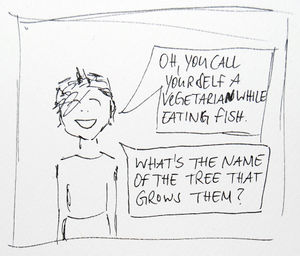NMTS-Group4: Difference between revisions
| (46 intermediate revisions by 2 users not shown) | |||
| Line 10: | Line 10: | ||
* [[User:Stephie R.| Stephie R.]] | * [[User:Stephie R.| Stephie R.]] | ||
* [[User:Jennifer Borchert| Jenny]] | * [[User:Jennifer Borchert| Jenny]] | ||
* [[User:Anna P.| Anna P.]]<br> | * [[User:Anna P.| Anna P.]]<br><br> | ||
=== Short Description of the Topic === | === Short Description of the Topic === | ||
| Line 22: | Line 22: | ||
(Levinson, 1997, p.107) | (Levinson, 1997, p.107) | ||
It may | It may at first seem that speaker B's answer has no relevance to speaker A's question. However, speaker B is in fact implying more than he or she actually <nowiki>'says'</nowiki>. Both speakers obviously share knowledge about the time at which the milkman normally comes and therefore Speaker B is actually suggesting that it is possible to calculate the approximate time from this fact. Speaker A is therefore able to infer information about the time from speaker B's answer. | ||
The implicature could be +> No, I don't have the exact time, but the milkman has aready come and he normally comes at 9:00, so it must be some time shortly after 9:00. | |||
This is an example of a (particularized) conversational implicature, however there are a number of different types of implicatures. Below is a brief overview: | This is an example of a (particularized) conversational implicature, however there are a number of different types of implicatures. Below is a brief overview: | ||
| Line 31: | Line 33: | ||
*Scalar implicatures | *Scalar implicatures | ||
*Conventional implicatures | *Conventional implicatures | ||
*Potential | *Potential implicatures | ||
*Actual | *Actual implicatures<br> | ||
<br> | <br> | ||
<span style="color:#00CC00">Students often have difficulties distinguishing between </span>[[Glossary:Implicature| implicatures]], [[Glossary:presupposition| presuppositions]] <span style="color:#00CC00">and </span>[[Glossary:entailment| entailments]].<span style="color:#00CC00">Click on each word for a brief definition.</span><br><br> | |||
<span style="color:#00CC00">Would you like to know more about implicatures? If so, please click [http://prezi.com/j0e85-li2vad/implicatures/ here] to view our Prezi presentation on implicatures</span><br> | <span style="color:#00CC00">Would you like to know more about implicatures? If so, please click [http://prezi.com/j0e85-li2vad/implicatures/ here] to view our Prezi presentation on implicatures!</span><br><br> | ||
== References and Links == | == References and Links == | ||
| Line 50: | Line 52: | ||
* [http://oxforddictionaries.com/definition/english/implicature?q=implicature Definition of implicature from the Oxford English Dictionary] | * [http://oxforddictionaries.com/definition/english/implicature?q=implicature Definition of implicature from the Oxford English Dictionary] | ||
* [http://plato.stanford.edu/entries/implicature/ Definition and detailed explanation from the Stanford Encylopedia of Philosophy] | * [http://plato.stanford.edu/entries/implicature/ Definition and detailed explanation from the Stanford Encylopedia of Philosophy] | ||
* [http://www.universalteacher.org.uk/lang/semantics.htm#6 Definition from Universal Teacher] | * [http://www.universalteacher.org.uk/lang/semantics.htm#6 Definition of implicature from Universal Teacher] | ||
* [http://www.glottopedia.de/index.php/Implicature Glottopedia Entry on Implicature]<br> | * [http://www.glottopedia.de/index.php/Implicature Glottopedia Entry on Implicature]<br> | ||
<br> | <br> | ||
| Line 63: | Line 65: | ||
* [[Glossary:Idiom| idiom]] | * [[Glossary:Idiom| idiom]] | ||
* [[Glossary:Implicature| implicature]] | * [[Glossary:Implicature| implicature]] | ||
* [[Glossary:Meronymy| meronymy]]<br> | * [[Glossary:Meronymy| meronymy]]<br><br> | ||
== Our Prezi Presentation == | |||
See our [http://prezi.com/j0e85-li2vad/implicatures/ Prezi] for an overview of some of the main topics of implicatures, including: | |||
*Grice's theory of implicatures (the cooperative principle and the maxims) | |||
*(Particularized) conversational implicatures | |||
*Conventional implicatures | |||
*Scalar implicatures. | |||
*Characteristic properties of implicatures | |||
*Tests for implicatures<br> | |||
<br> | |||
<span style="color:#00CC00">Would you like to know more about the characteristic properties of implicatures? If so, please view our podcast below!</span><br><br> | |||
== Our Podcast == | == Our Podcast == | ||
< | <embedvideo service="youtube" dimensions="400">http://www.youtube.com/watch?v=oUtSBL3wWZ0&feature=youtu.be</embedvideo><br> | ||
'''Group 4 - The 5 Characteristic Properties of Implicatures'''<br> | '''Group 4 - The 5 Characteristic Properties of Implicatures'''<br> | ||
| Line 75: | Line 89: | ||
References: Levinson, Stephen C (1997): ''Pragmatics''. Cambridge: Cambridge University Press.<br> | References: Levinson, Stephen C (1997): ''Pragmatics''. Cambridge: Cambridge University Press.<br> | ||
Music: by Dan-O at [http://www.DanoSongs.com DanoSongs.com] | Music: by Dan-O at [http://www.DanoSongs.com DanoSongs.com] | ||
<br/> | <br><br> | ||
<span style="color:#00CC00">Do you now understand implicatures? If so, test yourself using our online exercises below!</span> | |||
<br><br> | |||
= | <span style="color:red">Comments by [[User:Manfred|Manfred]]: There are minor problems in the podcast concerning the pronunciation of terms and the content, which is, however, why it cannot be incorporated into the main wiki.</span> | ||
== Our Online Excercises == | == Our Online Excercises == | ||
=== Exercise I=== | === Exercise I=== | ||
According to Grice's theory of conversational implicature, there are four basic maxims which specify how to be cooperative in conversation: '''Quantity, Manner, Quality''' and '''Relation'''. Grice believed that implicatures arise when these maxims are | According to Grice's theory of conversational implicature, there are four basic maxims which specify how to be cooperative in conversation: '''Quantity, Manner, Quality''' and '''Relation'''. Grice believed that implicatures arise when these maxims are violated and the speaker (relying on an assumption of cooperation) is forced to infer meaning.<br> | ||
Which of the four maxims are | Which of the four maxims are violated the five dialogues below? | ||
(Take a look at our [http://prezi.com/j0e85-li2vad/implicatures/ Prezi presentation] if you need help with the maxims.)<br> | (Take a look at our [http://prezi.com/j0e85-li2vad/implicatures/ Prezi presentation] if you need help with the maxims.)<br> | ||
| Line 106: | Line 112: | ||
Dad: Well, boys will be boys | Dad: Well, boys will be boys | ||
Maxim | Maxim violated:<span style="color:#FFFFFF"> QUANTITY (though some of you might prefer MANNER)</span> | ||
| Line 112: | Line 118: | ||
Student B: Well, let’s just say I don’t jump for joy before class. | Student B: Well, let’s just say I don’t jump for joy before class. | ||
Maxim | Maxim violated:<span style="color:#FFFFFF"> MANNER</span> | ||
| Line 124: | Line 130: | ||
Teacher: Oh no, of course not, we never do anything important in class. | Teacher: Oh no, of course not, we never do anything important in class. | ||
Maxim | Maxim violated:<span style="color:#FFFFFF"> QUALITY</span> | ||
| Line 130: | Line 136: | ||
Student B: Uh, It really is a nice day out, isn’t it? | Student B: Uh, It really is a nice day out, isn’t it? | ||
Maxim | Maxim violated:<span style="color:#FFFFFF"> RELATION</span><br> | ||
<br> | <br> | ||
| Line 169: | Line 175: | ||
Put the following sentences in the right order. Start with the sentence which contains the strongest | Put the following sentences in the right order. Start with the sentence which contains the strongest | ||
quantifier.<br> | quantifier.<br> | ||
(Take a look at our [http://prezi.com/j0e85-li2vad/implicatures/ Prezi presentation] if you need help with the scalar implicatures.)<br> | |||
| Line 185: | Line 193: | ||
'''Solution:'''<br /> | '''Solution:'''<br /><br> | ||
<span style="color:#FFFFFF">All of the boys went to the party.</span><br> | <span style="color:#FFFFFF">All of the boys went to the party.</span><br> | ||
| Line 194: | Line 202: | ||
<span style="color:#FFFFFF">Some of the boys went to the party.</span><br> | <span style="color:#FFFFFF">Some of the boys went to the party.</span><br> | ||
<span style="color:#FFFFFF">A few of the boys went to the party.</span><br> | <span style="color:#FFFFFF">A few of the boys went to the party.</span><br><br> | ||
<br> | -------- | ||
== Our Pictures == | == Our Pictures == | ||
| Line 201: | Line 209: | ||
<gallery> | <gallery> | ||
File:Frankfurt.jpg|Beautiful Frankfurt - Anna P. | File:Frankfurt.jpg|Beautiful Frankfurt - Anna P. | ||
File: | File:StephanieCh.jpg|Stephanie C | ||
File:Eule mit Tusche.jpg|Owl Illustration - Stephie R. | File:Eule mit Tusche.jpg|Owl Illustration - Stephie R. | ||
File:JenniferBorchert.jpg|Jenny | File:JenniferBorchert.jpg|Jenny | ||
Latest revision as of 17:54, 3 April 2016
Warning:
The material on this page has been created as part of a seminar. It is still heavily under construction and we do not guarantee its correctness. If you have comments on this page or suggestions for improvement, please contact Manfred Sailer.
This note will be removed once the page has been carefully checked and integrated into the main part of this wiki.
Group 4 - Implicatures
Overview
Members
Short Description of the Topic
An implicature is anything that is inferred from an utterance but that is not a condition for the truth of the utterance, or as the OED defines it a " meaning beyond the literal sense of what is explicitly stated".
For example, if we take the following short dialogue:
A: Can you tell me the time?
B: Well, the milkman has come.
(Levinson, 1997, p.107)
It may at first seem that speaker B's answer has no relevance to speaker A's question. However, speaker B is in fact implying more than he or she actually 'says'. Both speakers obviously share knowledge about the time at which the milkman normally comes and therefore Speaker B is actually suggesting that it is possible to calculate the approximate time from this fact. Speaker A is therefore able to infer information about the time from speaker B's answer.
The implicature could be +> No, I don't have the exact time, but the milkman has aready come and he normally comes at 9:00, so it must be some time shortly after 9:00.
This is an example of a (particularized) conversational implicature, however there are a number of different types of implicatures. Below is a brief overview:
- Conversational implicatures
- Generalized conversational implicatures
- Particularized conversational implicatures
- Scalar implicatures
- Conventional implicatures
- Potential implicatures
- Actual implicatures
Students often have difficulties distinguishing between implicatures, presuppositions and entailments.Click on each word for a brief definition.
Would you like to know more about implicatures? If so, please click here to view our Prezi presentation on implicatures!
References and Links
References
- Bieswanger, Markus & Annette Becker (2006): Introduction to English Linguistics (2nd edition). Tübingen and Basel: A. Francke Verlag.
- Grice, Paul (1975): Logic and conversation. In P. Cole and J. Morgan (eds): Syntax and Semantics 3, 41-58. New York: Academic Press.
- Levinson, Stephen C (1983): Pragmatics. Cambridge: Cambridge University Press.
- Yule, George (1996): Pragmatics. Oxford: Oxford University Press.
Links
- Definition of implicature from the Oxford English Dictionary
- Definition and detailed explanation from the Stanford Encylopedia of Philosophy
- Definition of implicature from Universal Teacher
- Glottopedia Entry on Implicature
Our E-learning Objects
Our Glossary Entries
in the Basic Glossary:
Our Prezi Presentation
See our Prezi for an overview of some of the main topics of implicatures, including:
- Grice's theory of implicatures (the cooperative principle and the maxims)
- (Particularized) conversational implicatures
- Conventional implicatures
- Scalar implicatures.
- Characteristic properties of implicatures
- Tests for implicatures
Would you like to know more about the characteristic properties of implicatures? If so, please view our podcast below!
Our Podcast
Group 4 - The 5 Characteristic Properties of Implicatures
Voice-over: Jenny
Editing: Anna P., Stephanie C., Stephie R.
References: Levinson, Stephen C (1997): Pragmatics. Cambridge: Cambridge University Press.
Music: by Dan-O at DanoSongs.com
Do you now understand implicatures? If so, test yourself using our online exercises below!
Comments by Manfred: There are minor problems in the podcast concerning the pronunciation of terms and the content, which is, however, why it cannot be incorporated into the main wiki.
Our Online Excercises
Exercise I
According to Grice's theory of conversational implicature, there are four basic maxims which specify how to be cooperative in conversation: Quantity, Manner, Quality and Relation. Grice believed that implicatures arise when these maxims are violated and the speaker (relying on an assumption of cooperation) is forced to infer meaning.
Which of the four maxims are violated the five dialogues below?
(Take a look at our Prezi presentation if you need help with the maxims.)
To see the solution, simply mark the line behind 'Maxim violated' under every dialogue.
a) Mom: What did you think of Junior’s childish behavior last night?
Dad: Well, boys will be boys
Maxim violated: QUANTITY (though some of you might prefer MANNER)
b) Student A: Do you like Linguistics?
Student B: Well, let’s just say I don’t jump for joy before class.
Maxim violated: MANNER
c) Teacher A: Do you have any rude students this semester?
Teacher B: All students are rude.
Maxim violated: QUALITY
d) Student: I was absent on Monday - did I miss anything important?
Teacher: Oh no, of course not, we never do anything important in class.
Maxim violated: QUALITY
e) Student A: (while waiting for class to begin) Isn’t Professor X a jerk?
Student B: Uh, It really is a nice day out, isn’t it?
Maxim violated: RELATION
Exercise II
Common examples of implicatures can be found in figures of speech such as Irony, Sarcasm, Hyperbole or Metaphor. Look at the pictures below and decide which of the figures of speech apply:
To see the solution, simply mark the line behind the word 'solution' under every picture.
Solution: HYPERBOLE
Solution: IRONY
Solution: METAPHOR
Solution: SARCASM
Exercise III
This exercise deals with Scalar Implicatures. A linguistic scale consists of a set of linguistic
alternates, or contrastive expressions of the same grammatical category, which can be arranged in
a linear order by degree of informativeness or semantic strength.
Put the following sentences in the right order. Start with the sentence which contains the strongest
quantifier.
(Take a look at our Prezi presentation if you need help with the scalar implicatures.)
Again, to see the solution, simply mark the lines under the word 'solution'.
All of the boys went to the party.
Some of the boys went to the party.
Most of the boys went to the party.
A few of the boys went to the party.
Many of the boys went to the party
Solution:
All of the boys went to the party.
Most of the boys went to the party.
Many of the boys went to the party.
Some of the boys went to the party.
A few of the boys went to the party.











